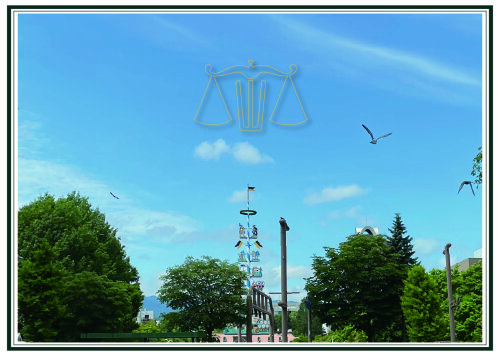Best Sexual Harassment Lawyers in Sapporo
Share your needs with us, get contacted by law firms.
Free. Takes 2 min.
List of the best lawyers in Sapporo, Japan
About Sexual Harassment Law in Sapporo, Japan
In Japan, sexual harassment is taken very seriously and the city of Sapporo is no exception. The country has specific laws and measures in place to prevent and address issues of sexual harassment both in the workplace and in public spaces. The Equal Employment Opportunity Law prohibits sexual harassment in the workplace and encourages employers to implement policies to prevent inappropriate behavior. It is important for residents and visitors in Sapporo to understand their rights and the legal framework that exists to protect them from sexual harassment.
Why You May Need a Lawyer
Individuals may require legal help in cases of sexual harassment for various reasons. For instance, if you have been harassed at work and the internal complaint mechanisms have not resolved the issue, a lawyer can help you take further legal action. Additionally, in cases where the harassment has led to psychological injury or if the individual has been retaliated against for reporting the harassment, legal expertise is important for pursuing justice and compensation.
Local Laws Overview
The fundamental laws addressing sexual harassment in Sapporo are consistent with Japanese national law. The Equal Employment Opportunity Law addresses harassment in the workplace, obligating employers to prevent sexual harassment and to take action if it occurs. The Penal Code of Japan also covers sexual crimes and can be used to prosecute more severe cases of sexual harassment. Be aware that the specific implementation of these laws may vary in Sapporo and seeking local legal advice is beneficial for understanding the nuances of these applications.
Frequently Asked Questions
What constitutes sexual harassment in Japan?
Sexual harassment in Japan includes unwelcome sexual advances, requests for sexual favors, and other verbal or physical harassment of a sexual nature that creates a hostile work environment or leads to adverse employment decisions.
Can I file a complaint about sexual harassment that occurred outside the workplace?
Yes, you can file a complaint about harassment that occurred in public spaces or private settings, though the process may differ from workplace-related complaints.
Are there any time limits for filing a sexual harassment claim in Sapporo?
While there are statutory time limits for criminal charges and civil actions, they vary depending on the specifics of the case. It's best to seek legal advice as soon as possible.
Do I need evidence of the harassment to seek legal help?
Evidence is helpful to strengthen your case, but even without concrete evidence, you should still seek legal advice as a lawyer can guide you on how to proceed and collect supporting information.
Is an employer in Sapporo required to act on a sexual harassment complaint?
Yes, under the Equal Employment Opportunity Law, employers in Sapporo are required to take complaints seriously and must act to investigate and resolve the issue.
Can I be fired for reporting sexual harassment in Sapporo?
It is illegal for an employer to retaliate against an employee for reporting sexual harassment. If you are subjected to unfair treatment or dismissal as a result of your report, you may have grounds for legal action.
What if the harasser is my superior?
The same laws apply whether the harasser is a colleague, a superior, or even a client. Employers must address harassment regardless of the perpetrator's position within the company.
What are the potential repercussions for someone found guilty of sexual harassment?
The repercussions depend on the severity of the case, ranging from company-imposed penalties, like demotion or dismissal, to legal penalizations under criminal law for more serious cases.
How confidential is the reporting process for sexual harassment?
Confidentiality is an important aspect of the reporting process. Employers and legal professionals should ensure the victim's identity and details of the case are kept confidential to protect their privacy.
What support services are available for victims of sexual harassment?
In Sapporo, there are various support services available for victims, including counseling centers, legal support clinics, and hotlines to offer assistance through the process.
Additional Resources
Victims of sexual harassment in Sapporo can reach out to organizations such as the Sapporo Gender Equality Center, which provides support and information to individuals facing harassment. Additionally, there are national organizations such as the Human Rights Consultation Offices (operated by the Japan Legal Support Center) that can be incredibly helpful.
Next Steps
If you need legal assistance in Sapporo for issues concerning sexual harassment, the first step is to consult with a lawyer experienced in Japan's anti-harassment laws. They will guide you through the process of documenting the harassment, reporting it to the appropriate authorities, and if necessary, taking legal action to protect your rights and seek compensation for damages incurred.
Lawzana helps you find the best lawyers and law firms in Sapporo through a curated and pre-screened list of qualified legal professionals. Our platform offers rankings and detailed profiles of attorneys and law firms, allowing you to compare based on practice areas, including Sexual Harassment, experience, and client feedback.
Each profile includes a description of the firm's areas of practice, client reviews, team members and partners, year of establishment, spoken languages, office locations, contact information, social media presence, and any published articles or resources. Most firms on our platform speak English and are experienced in both local and international legal matters.
Get a quote from top-rated law firms in Sapporo, Japan — quickly, securely, and without unnecessary hassle.
Disclaimer:
The information provided on this page is for general informational purposes only and does not constitute legal advice. While we strive to ensure the accuracy and relevance of the content, legal information may change over time, and interpretations of the law can vary. You should always consult with a qualified legal professional for advice specific to your situation.
We disclaim all liability for actions taken or not taken based on the content of this page. If you believe any information is incorrect or outdated, please contact us, and we will review and update it where appropriate.












